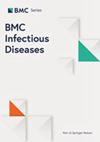Significant drop in serum C-reactive protein in patients with solid neoplasia and bacterial infection is associated with a better prognosis and identifies candidates for short-course antibiotic therapy
IF 3.4
3区 医学
Q2 INFECTIOUS DISEASES
引用次数: 0
Abstract
The greater predisposition to infections, as well as the possibility of a worse response to treatment, can lead to the excessive use of antimicrobials among cancer patients. C-reactive protein (CRP) has gained prominence as a tool for monitoring therapeutic responses and reducing the duration of antibiotic therapy; however, few studies have analyzed this protein in cancer patient populations. We hypothesize that cancer patients with a good response to antibiotic therapy show a faster decline in serum CRP levels, which would allow us to identify candidates for short-course treatments. To evaluate the behavior of serum CRP levels among adult cancer patients using antibiotic therapy, and its association with the duration of this treatment, therapeutic response, and clinical recurrence. This work consisted of a retrospective study with cancer patients admitted to a university hospital between September 2018 and December 2019. Adults (age ≥ 18 years) who underwent at least one course of antibiotic therapy were included. CRP behavior over the first 7 days of treatment was classified as: i) good response: when the CRP value on the fifth day of therapy reached 50% or less of the peak value detected in the first 48 h of treatment, and ii) poor response: Maintenance, within the same interval, of a CRP value > 50% of the peak value in the first 48 h. The duration of antibiotic therapy was categorized as up to seven full days or more. Outcomes were assessed by events that occurred during the 30 days of hospitalization or until hospital discharge. Primary outcome: Clinical recurrence of the index infection. Secondary outcomes: i) Death from any cause; ii) microbiological recurrence; iii) therapeutic response; iv) colitis associated with Clostridioides difficile; and v) isolation of multi-resistant bacteria, whether in clinical or surveillance samples. The final analysis consisted of 212 patients, with a median age (IQ) of 59.2 (48 – 67) years old and a predominance of females (65%), who were hypertensive (35%), smokers (21%), and diabetics (17.8%). There was no difference in clinical recurrence between the two groups (8.1% vs. 12.2%; p = 0.364), with a lower 30-day mortality in the good CRP response group (32.2% vs. 14.5%; p = 0.002). Despite the tendency towards a lower occurrence of other secondary outcomes in the good response group, these differences were not statistically significant. In the poor CRP response group, outcomes like clinical recurrence, mortality, and therapeutic response were significantly worse, regardless of the duration of antibiotic treatment. In this study, cancer patients with a good CRP response during antibiotic therapy presented lower mortality and a higher proportion of satisfactory therapeutic responses. CRP can be a useful tool when combined with other clinical information in optimizing the duration of antimicrobial treatment in a hospitalized cancer population.实体瘤和细菌感染患者血清 C 反应蛋白的显著下降与较好的预后有关,并可确定接受短程抗生素治疗的候选者
癌症患者更容易受到感染,而且对治疗的反应可能更差,这可能导致他们过度使用抗菌药。C反应蛋白(CRP)作为一种监测治疗反应和缩短抗生素治疗时间的工具,其作用日益突出;然而,很少有研究对癌症患者群体中的这种蛋白进行分析。我们假设,对抗生素治疗反应良好的癌症患者血清 CRP 水平会下降得更快,这样我们就能确定短期治疗的候选者。目的:评估使用抗生素治疗的成年癌症患者血清 CRP 水平的变化及其与治疗持续时间、治疗反应和临床复发的关系。这项工作由一项回顾性研究组成,研究对象为2018年9月至2019年12月期间入住某大学附属医院的癌症患者。研究对象包括接受过至少一个疗程抗生素治疗的成年人(年龄≥ 18 岁)。治疗前 7 天的 CRP 表现分为:i)良好反应:治疗第五天的 CRP 值达到或低于治疗前 48 小时检测到的峰值的 50%;ii)不良反应:抗生素治疗持续时间为最长七天或更长。结果通过住院 30 天或出院前发生的事件进行评估。主要结果:指标感染的临床复发。次要结局:i) 任何原因导致的死亡;ii) 微生物复发;iii) 治疗反应;iv) 艰难梭菌相关结肠炎;v) 在临床或监测样本中分离出多重耐药菌。最终分析结果包括 212 名患者,中位年龄(IQ)为 59.2(48 - 67)岁,女性占多数(65%),高血压患者占 35%,吸烟者占 21%,糖尿病患者占 17.8%。两组患者的临床复发率没有差异(8.1% 对 12.2%;P = 0.364),CRP 反应良好组的 30 天死亡率较低(32.2% 对 14.5%;P = 0.002)。尽管反应良好组的其他次要结果发生率较低,但这些差异并无统计学意义。在 CRP 反应不良组,无论抗生素治疗持续时间长短,临床复发、死亡率和治疗反应等结果都明显较差。在这项研究中,抗生素治疗期间 CRP 反应良好的癌症患者死亡率较低,治疗反应令人满意的比例较高。CRP与其他临床信息相结合,可以成为优化住院癌症患者抗菌治疗时间的有用工具。
本文章由计算机程序翻译,如有差异,请以英文原文为准。
求助全文
约1分钟内获得全文
求助全文
来源期刊

BMC Infectious Diseases
医学-传染病学
CiteScore
6.50
自引率
0.00%
发文量
860
审稿时长
3.3 months
期刊介绍:
BMC Infectious Diseases is an open access, peer-reviewed journal that considers articles on all aspects of the prevention, diagnosis and management of infectious and sexually transmitted diseases in humans, as well as related molecular genetics, pathophysiology, and epidemiology.
 求助内容:
求助内容: 应助结果提醒方式:
应助结果提醒方式:


